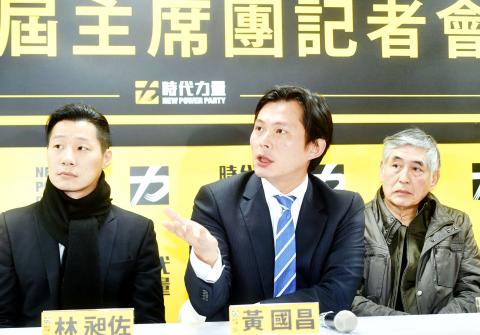New Power Party (NPP) Legislator Huang Kuo-chang (黃國昌) was re-elected as party executive chairman yesterday, following repeated delays and rumors of internal party tension.
“Today we held a chairmen’s meeting and, based on our decision, I will continue to serve as the party’s executive chairman,” Huang said in a news conference following the meeting, adding that the decision was unanimous.
His re-election follows a reshuffling of the party’s board of chairmen about two weeks ago, in keeping with party charter provisions mandating new leadership elections after every national election.

Photo: Fang Pin-chao, Taipei Times
Huang said that important decisions would be made by a larger decisionmaking committee composed of the seven party chairmen, along with the conveners of eight different internal policy and work committees.
When asked if there had been conflict over the party’s direction, Huang said: “Everything about the party’s operation is conducted in accordance with the party charter.”
He said that mandating a separation between the party’s internal leadership and national legislators would require the decisionmaking committee to revisit the party’s charter, adding that each of the party’s national legislators would take responsibility for local leadership in their assigned districts.
Neil Peng (馮光遠), former NPP legislative candidate who was also elected to the board of chairmen, called for the executive chairmanship position to be awarded to someone other than the party’s legislators to preserve the party machinery’s independence from legislators.
He said he accepted the result of yesterday’s meeting, which had been delayed by his demand that every member of the board be present before an official meeting could be held.
When asked about his party’s plans to remain relevant and avoid the fates of other small parties such as the New Party and Taiwan Solidarity Union, Huang said his strategy would focus on continuing to produce high-quality legislation while cultivating young people to participate in the 2018 local elections.

A preclearance service to facilitate entry for people traveling to select airports in Japan would be available from Thursday next week to Feb. 25 at Taiwan Taoyuan International Airport, Taoyuan International Airport Corp (TIAC) said on Tuesday. The service was first made available to Taiwanese travelers throughout the winter vacation of 2024 and during the Lunar New Year holiday. In addition to flights to the Japanese cities of Hakodate, Asahikawa, Akita, Sendai, Niigata, Okayama, Takamatsu, Kumamoto and Kagoshima, the service would be available to travelers to Kobe and Oita. The service can be accessed by passengers of 15 flight routes operated by

Chinese spouse and influencer Guan Guan’s (關關) residency permit has been revoked for repeatedly posting pro-China videos that threaten national security, the National Immigration Agency confirmed today. Guan Guan has said many controversial statements in her videos posted to Douyin (抖音), including “the red flag will soon be painted all over Taiwan” and “Taiwan is an inseparable part of China,” and expressing hope for expedited reunification. The agency last year received multiple reports alleging that Guan Guan had advocated for armed reunification. After verifying the reports, the agency last month issued a notice requiring her to appear and explain her actions. Guan

GIVE AND TAKE: Blood demand continues to rise each year, while fewer young donors are available due to the nation’s falling birthrate, a doctor said Blood donors can redeem points earned from donations to obtain limited edition Formosan black bear travel mugs, the Kaohsiung Blood Center said yesterday, as it announced a goal of stocking 20,000 units of blood prior to the Lunar New Year. The last month of the lunar year is National Blood Donation Month, when local centers seek to stockpile blood for use during the Lunar New Year holiday. The blood demand in southern Taiwan — including Tainan and Kaohsiung, as well as Chiayi, Pingtung, Penghu and Taitung counties — is about 2,000 units per day, the center said. The donation campaign aims to boost

The Central Weather Administration (CWA) said a magnitude 4.9 earthquake that struck off the coast of eastern Taiwan yesterday was an independent event and part of a stress-adjustment process. The earthquake occurred at 4:47pm, with its epicenter at sea about 45.4km south of Yilan County Hall at a depth of 5.9km, the CWA said. The quake's intensity, which gauges the actual effects of a temblor, was highest in several townships in Yilan and neighboring Hualien County, where it measured 4 on Taiwan's seven-tier intensity scale, the CWA said. Lin Po-yu (林柏佑), a division chief at the CWA's Seismological Center, told a news conference